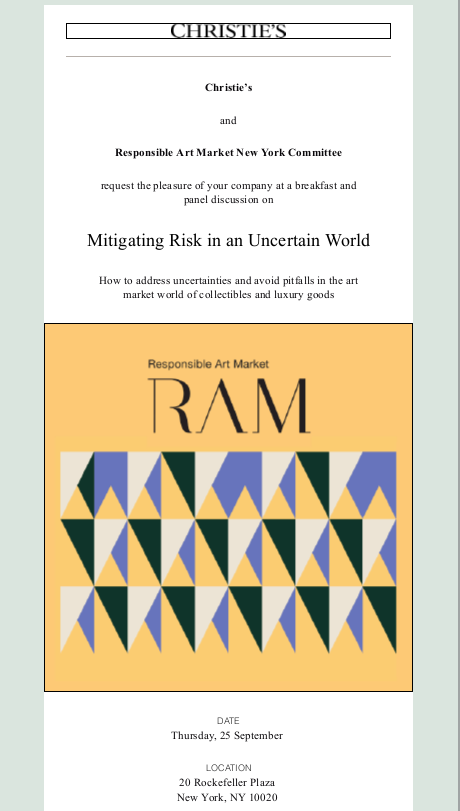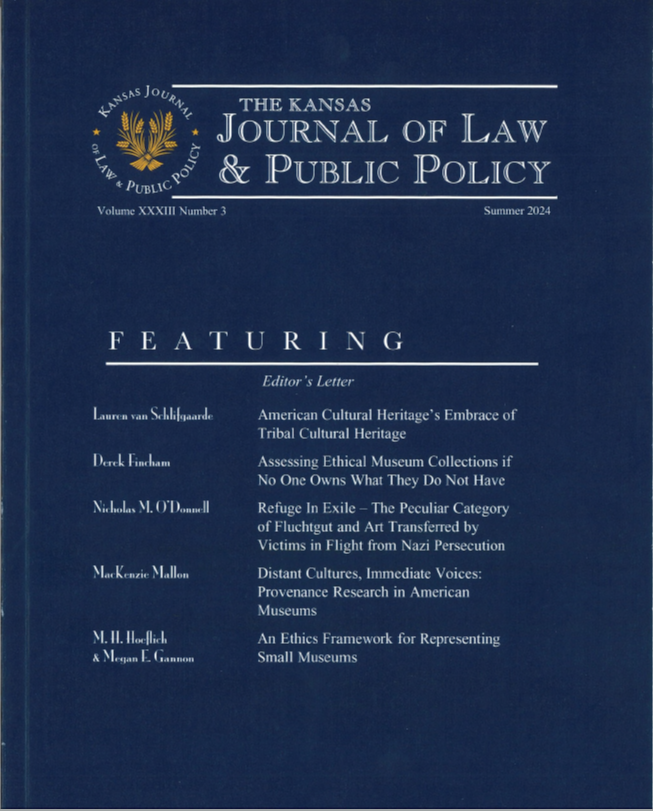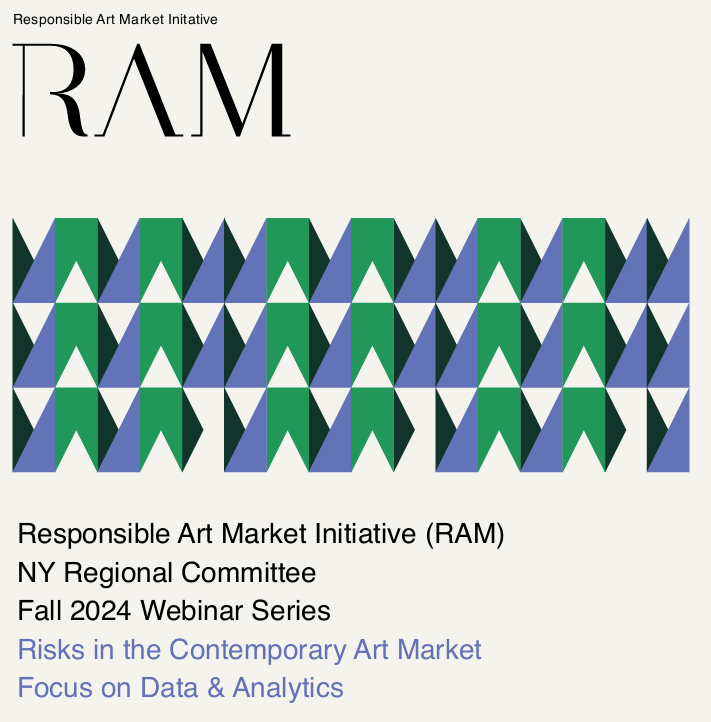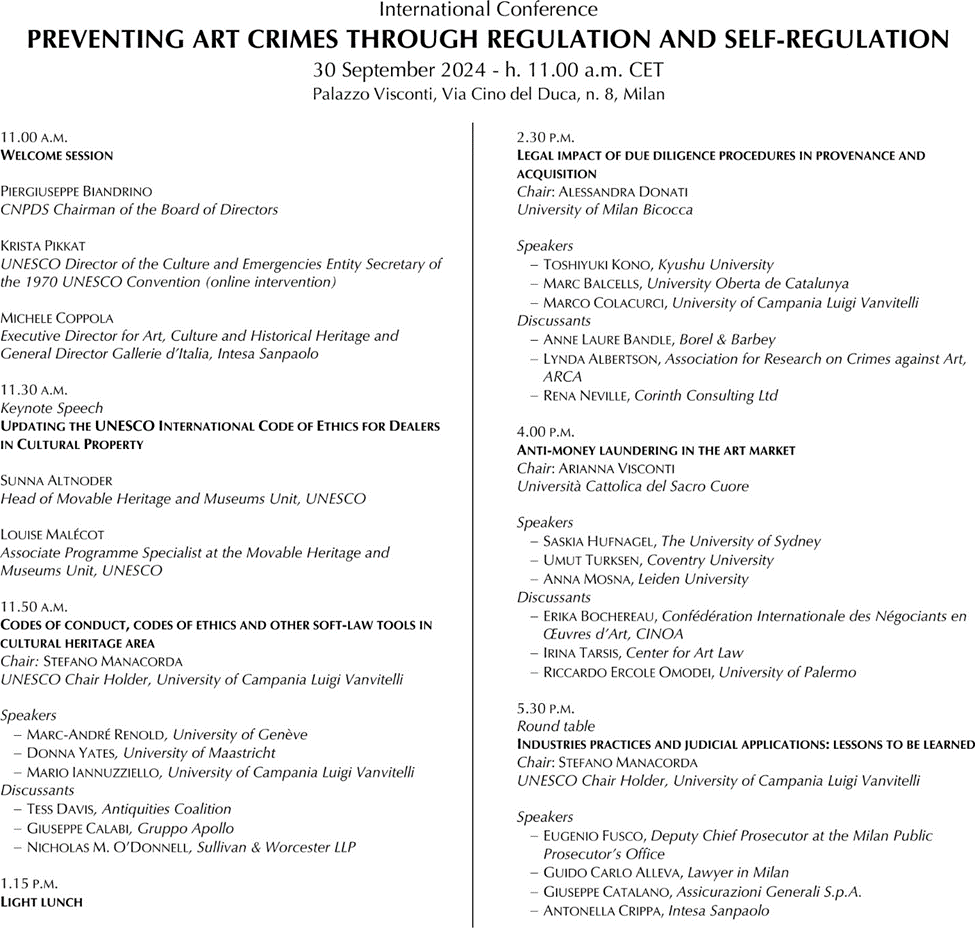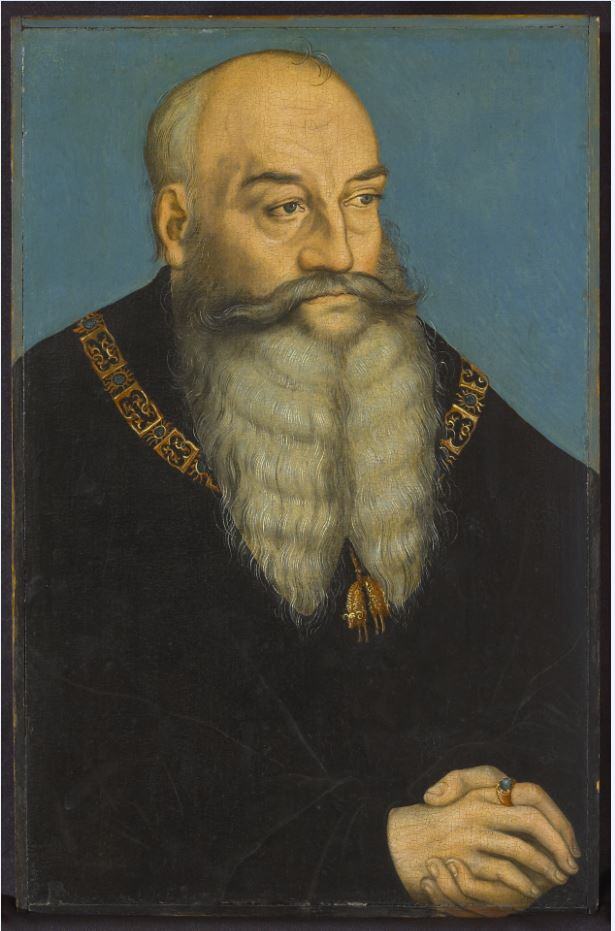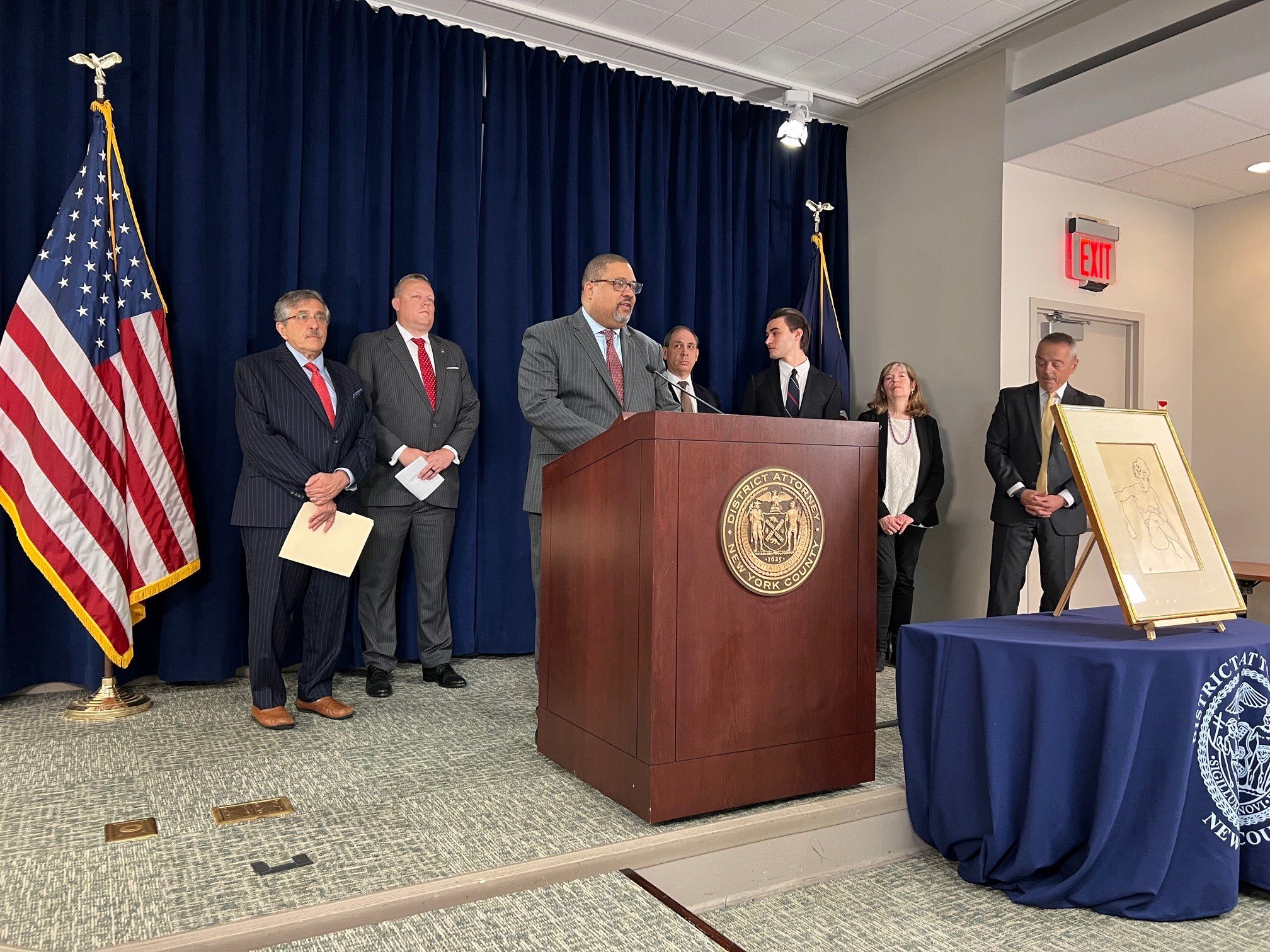I am delighted to announce that the New York chapter of the Responsible Art Market Initiative and Christie’s have organized an event on September 25, 2025, at Rockefeller Center: “Mitigating Risk in an Uncertain World.” Co-chair Birgit Kurtz and I will offer opening and closing remarks to table-set for a fantastic panel, and to look ahead to RAM’s 10th Annual Conference in Geneva in January (more to come on that soon).
Nicholas O'Donnell

Recent Posts
Responsible Art Market Initiative and Christie's Event: Mitigating Risk in an Uncertain World
Topics: Christie's, Events, Responsible Art Market initiative, Birgit Kurtz, Bank of America Private Bank, Nicole Jacoby, Margaret Hoag, Dana Prussian Haney, Anne Rappa, Marsh McLennan
Chapman Law Review Article Spotlights Recent Supreme Court Missteps on Sovereign Immunity and Cultural Property, Calls for Congress to Act
I am proud to announce the publication in the Chapman Law Review of my article: “Turnabout is Foul Play: Sovereign Immunity and Cultural Property Claims,” which you can link to here. The abstract of the article is below.
Topics: Second Hickenlooper Amendment, Act of State, Nazi-looted art, Foreign Sovereign Immunities Act, FSIA, expropriation exception”, 28 U.S.C. § 1605(a)(3), Genocide Convention, Nazi-confiscated art, F.R.G. v. Philipp, domestic takings, Chapman Law Review, Turnabout is Foul Play, Sovereign Immunity and Cultural Property Claims, Roberts Court, Taline Ratanjee, Greg Mikhanjian, Anna Ross, Amber Odell, Sara Morandi
Holocaust Expropriated Art Recovery Act of 2025 Would Extend Prior Law on Nazi-era Art Claims, Overrule Supreme Court on Sovereign Immunity
Senator Jon Cornyn (R-TX) introduced the Holocaust Expropriated Art Recovery Act of 2025 on May 22, 2025, as Senate Bill 1884, with seven co-sponsors. The bill would extend provisions of the Holocaust Expropriated Art Recovery Act (HEAR Act) of 2016 with respect to the statute of limitations on Nazi-era art recovery claims in U.S. courts, and would rebuke the Supreme Court’s disastrous ruling in 2021 that Nazi art loss victims from Germany were not the subject of takings in violation of international law. The bill is an important step in Holocaust-era art claims and should be passed.
Topics: laches, Act of State, Statute of Limitations, Holocaust Expropriated Art Recovery Act, Richard Blumenthal, HEAR Act, Genocide Convention, Nazi-confiscated art, F.R.G. v. Philipp, Marsha Blackburn, Eric Schmidt, Katie Boyd Britt, domestic takings, Cory Booker, Thomas Tillis, Chapman Law Review, forum non conveniens, John Fetterman
Making Sense of Canada and Mexico Tariffs in the Art Market
Topics: The Art Newspaper, Customs, President, COVID-19, White House, Mexico, Canada, Constitution, Customs and Border Protection, Tariffs, Tariff Act of 1930, Smoot-Hawley, Federal Register, Department of Homeland Security, Higher Education Act of 1965, Notice of Implementation of Additional Duties, International Emergency Economic Powers Act, National Emergencies Act, 50 U.S.C. § 1702(a)(1)(B), Administrative Procedures Act, HEROES Act, Biden v. Nebraska, Loper Bright Enterprises v. Raimondo
Kansas Law Review Article Examines the Legal Status of Fluchtgut: Art Transferred as Result of Circumstances Set in Motion by Nazi Persecution
I was honored to take part in a symposium last February at the University of Kansas School of Law entitled “A Museum’s Purpose,” which addressed a variety of cultural property related topics. KU was a wonderful host, and Lawrence is a charming town. I spent a great weekend in Kansas City (which was perfect aside from the then-recent Chiefs Super Bowl win-Go Pats!), saw a Jayhawks basketball game, and even visited the grave of Dr. James Naismith, who invented the great sport of basketball in Springfield, Massachusetts.
I am pleased to announce that the article I wrote for the symposium has been published in the Kansas Journal of Law & Public Policy. Entitled “Refuge in Exile—the Peculiar Category of Fluchtgut and Art Transferred by Victims in Flight from Nazi Persecution,” my paper seeks to address the legal status of works that changed hands in the Nazi era that are not strictly covered by the more familiar frameworks of Nazi expropriation and forced sales that have been the focus of most of the discussion since the Washington Conference in 1998, and propose a judicial and analytical framework to deal with them. In my own practice this year, the Allentown Cranach story is an illustrative example.
Topics: University of Kansas, South Texas College of Law, Washington Conference Principles, UCLA School of Law, Nazi persecution, flight goods, Derek Fincham, Fluchtgut, Dr. James Naismith, Lauren Van Schilfgaarde, MacKenzie Mallon, Michael Hoeflich, Kansas Journal of Law & Public Policy, The Nelson-Atkins Museum of Art, Megan Gannon
Responsible Art Market Initiative (NY) Series: Risks in the Contemporary Art Market Focus on Data & Analytics
As co-chair (with Birgit Kurtz) of the New York chapter of the Responsible Art Market Initiative, I hope you will join us for a two-part webinar focusing on data in the art market. The webinars will take place on October 30, 2024, and November 6, 2024. Registration is available here.
Topics: Emigrant Bank Fine Art Finance, Yale University, Suzanne Gyorgy, Winston Art Group, Responsible Art Market initiative, Nanne Dekking, Artory, Charles Moffett Gallery, ArtTactic, Magnus Resch, Minerva Pinto, Goldman Sachs, Ann Tenenbaum, Erica Barrish, EAB Fine Art Services, Charles Moffett, Jr., Anders Petterson
Preventing Art Crimes Through Regulation and Self-Regulation: Conference September 30, 2024
I am pleased to announce that I will be among the speakers in Milan on September 30, 2024 at a conference organized by the Universitá degli Studi della Campania Luigi Vantivelli and the UNESCO Chair on Business Integrity and Crime Prevention in Art and Antiquities Market: “Preventing Art Crimes Through Regulation and Self-Regulation.” To be held at the Palazzo Visconti, the conference will offer a full day of expert speakers on the topics of Updating the UNESCO International Code of Ethics for Dealers in Cultural Property; Codes of Conduct, Codes of Ethics and Other Soft Law Tools in Cultural Heritage (in which I will be a discussant); the Legal Impact of Due Diligence Procedures and Acquisition, Anti-Money Laundering in the Art Market; and Industry Practices and Judicial Applications: Lessons to be Learned. The program is below, and registration may be found here.
As the title and expertise of the participants suggest, this will be an excellent broad view of the question of regulation in cultural property, and the extent to which market participants can guide the outcome. It will focus on public-private partnerships for the prevention of wrongdoings against cultural property, and specific attention will be devoted to the role that codes of conduct, due diligence, and KYC procedures play in this area. I am excited to be a part of the event and see many old friends. I hope that if you are nearby you will join us, or attend remotely if you are not.
Topics: Anne Laure Bandle, Irina Tarsis, Saskia Hufnagel, Events, UNESCO, ARCA, Center for Art Law, Leiden University, Borel & Barbey, Giuseppe Calabi, Sunna Altnoder, Louise Malécot, Stefano Manacorda, Universitá Luigi Vantivelli, Tess Davis, Antiquities Coalition, Alessandra Donati, University of Milan Bicocca, Toshiyuki Kono, Kyushu University, Marc Balcells, Marco Colacurci, Lynda Albertson, Association for Research on Crimes Against Art, Rena Neville, Corinth Consulting Ltd., Arianna Visconti, Universitá Cattolica del Sacro Cuore, Umit Turksen, Coventry University, Anna Mosna, Erika Bochereau, CINOA, Riccardo Ercole Omodel, University of Palermo, Eugenio Fusco, Milan Public Prosecutor, Guido Carlo Alleva, Giuseppe Catalano, Assicurazioni Generali S.p.A., Antonella Crippa, Intesa Sanpaolo, Palazzo Visconti, University Oberta de Catalunya, University of Sydney
Federal Appeals Court Strikes Another Blow to Chabad Cultural Property Claims Against Russia
The U.S. Court of Appeals for the D.C. Circuit recently dismissed a long-running dispute against Russia concerning the library of the Lubavitcher Rebbe (the Library), a collection of books and papers once held by the then-Rebbe of the Chabad Lubavitch movement. Agudas Chasidei Chabad of United States v. Russian Fed’n, 110 F.4th 242 (D.C. Cir. 2024) (Chabad 2024). Brought under what is known as the expropriation exception, 28 U.S.C. § 1605(a)(3), of the Foreign Sovereign Immunities Act (the FSIA), the case has involved Russia’s withdrawal from the case and default, sanctions of $50,000 per day for non-compliance and a judgment of more than $175 million, a retaliatory embargo on cultural property exchange that continues to this day, and multiple appeals.
In the most recent decision, the court of appeals held that the second element of the expropriation exception (what is known as the commercial nexus requirement) was not met and therefore deprived the court of any jurisdiction. Specifically, the D.C. Circuit held that if the defendant is the foreign state, the expropriation exception may only be invoked if the property is physically present in the United States (which the Rebbe’s library is not). The Supreme Court has declined to review two relatively recent cases that reached the same conclusion, it will bear watching of the plaintiffs seek further review now given a circuit split with the 9th Circuit on the issue.
Topics: de Csepel, Immunity from Seizure, Foreign Sovereign Immunities Act, Supreme Court, Agudas Chasidei Chabad, Russian Federation, FSIA, expropriation exception”, sovereign immunity, Russian State Library, Chabad, Federal Republic of Germany, Welfenschatz, D.C. Circuit, Federal Republic of Germany v. Philipp, Simon v. Republic of Hungary, Lubavitcher Rebbe, Schubarth, Judge Randolph, Brett Kavanaugh, Judge Griffith
Allentown Art Museum to Auction Cranach Painting Once Owned by Collector Persecuted in Nazi Germany
I was proud to advise the Allentown Art Museum, which announced today that it has reached an agreement with the heirs of Henry and Hertha Bromberg concerning Portrait of George, Duke of Saxony by Lucas Cranach the Elder and his workshop. Pursuant to the agreement, the painting will be auctioned at Christie’s in New York next year following educational programming focusing on the painting’s history. The Museum’s press release can be read here. The story was also addressed in an excellent article in The New York Times by Graham Bowley.
(Portrait of George the Bearded, Duke of Saxony, by Lucas Cranach the Elder and workshop)
Topics: Graham Bowley, Paris, Washington Conference Principles, Christie's, Hamburg, Lucas Cranach the Elder, The New York Times, Nazi-confiscated art, Henry Bromberg, Hertha Bromberg, Martin Bromberg, Max Weintraub, Reichsfluchtsteuer, Allen Loebl, F. Kleinberger Gallery, property inventory, Allentown Art Museum, Portrait of George the Bearded Duke of Saxony, Porträt des Georg dem Bärtigen Herzog von Sachsen, Vermögensverzeichnis, Wildenstein
Schiele Drawing Returned to Heirs by Family that Also Fled Nazi Persecution
I attended today’s press conference at District Attorney Alvin Bragg, Jr.’s office in Manhattan at which a drawing by Egon Schiele, Seated Nude Woman, Front View, was transferred to the heirs of Fritz Grünbaum. I represent the family of Gustav (“Gus”) Papanek, who relinquished the drawing to the District Attorney earlier this year. This case spotlights, once again, the breadth of Nazi crimes more than 80 years later. The Grünbaum story has rightly received considerable coverage (including a chapter in my book A Tragic Fate—Law and Ethics in the Battle Over Nazi Looted Art), my clients’ story is not widely known. I was honored to represent them today and throughout the process.
(Today's ceremony)
Topics: Egon Schiele, The New York Times, Vienna, Bern, A Tragic Fate, Eberhard Kornfeld, Fritz Grünbaum, Gustav (“Gus”) Papanek, Galerie Gutekunst & Klipstein, Alvin Bragg Jr., Seated Nude Woman Front View, Ernst Papanek, Helene Papanek

